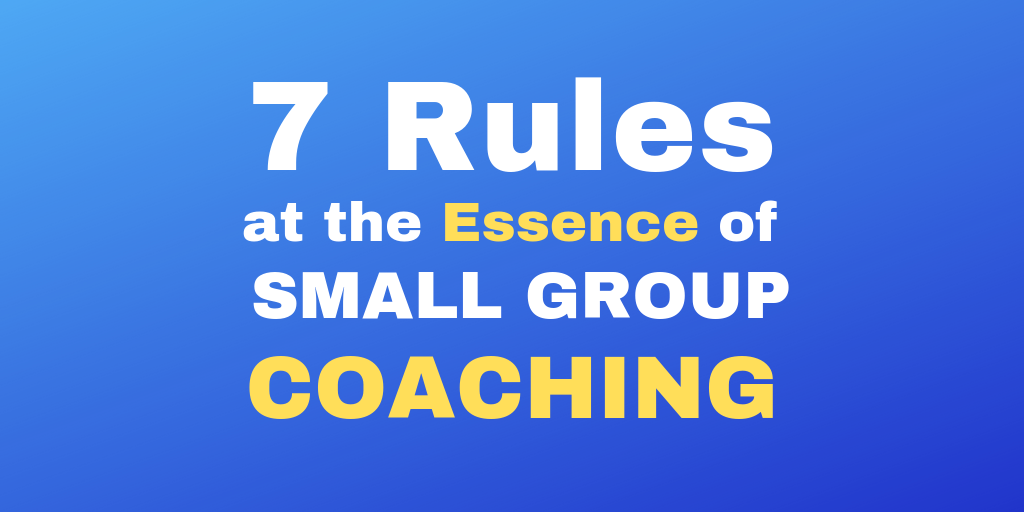7 Rules at the Essence of Small Group Coaching
 I was on a coaching call yesterday and as we talked I realized that there are certain ideas, rules really, that always pop up in my conversations about small group coaching.
I was on a coaching call yesterday and as we talked I realized that there are certain ideas, rules really, that always pop up in my conversations about small group coaching.
Here are 7 rules at the essence of small group coaching:
1. Whatever you want to happen in the lives of small group members has to happen first in the lives of your small group leaders.
This is an idea at the very essence of coaching. It is just not wise to assume that small group leaders will be prepared to shepherd the members of their group in a way that makes disciples. If you want to make disciples you've got to invest in your leaders first. This has implications for how you develop your coaches too. Can you see it?
If you want to make disciples you've got to invest in your leaders first. Share on X
See also, Life Change at the Member Level and 7 Practices for Developing and Discipling Your Coaches.
2. You can't build an effective coaching structure with people who are warm and willing.
They need to be hot and qualified. I got this line from Don Cousins over 20 years ago and it gets proven over and over again. Building an effective coaching structure requires high capacity men and women who are passionate about investing in leaders.
You can't build an effective coaching structure with people who are warm and willing. They need to be hot and qualified. Share on X
See also, How to Build an Effective Coaching Structure.
3. Everyone needs to be cared for by someone, but nobody can take care of more than (about) ten.
Carl George's great shorthand for Jethro's instructions to Moses in Exodus 18 is an understanding at the essence of coaching. High capacity volunteers can invest in about 5 small group leaders (and often their apprentices).
See also, Span of Care.
4. Coaching has very little to do with teaching technique (i.e., how to lead a discussion or how to subdivide your group for a deeper connection).
Adults learn on a need to know basis and new small group leaders learn most of what they need to know in the way of technique in the first 3 or 4 months. Otherwise their new group dies.
Adults learn on a need to know basis and new small group leaders learn most of what they need to know in the way of technique in the first 3 or 4 months. Otherwise their new group dies. Share on X
See also, 7 Core Ideas about Small Group Coaching and Coaching FAQ: How Much of Coaching Is About Technique?
5. Coaching has everything to do with care.
Care is about doing to and for the leader whatever you want the leader to do to and for their members.
Care is about doing to and for the leader whatever you want the leader to do to and for their members. Share on X
See also, 6 Essential Characteristics of an Effective Small Group Coach.
6. New small group leaders will almost always eagerly accept coaching.
New small group leaders don't know what they don't know, but they quickly discover they could use some help. New small group leaders typically learn nearly everything they need to know in their first 3 or 4 months. If new small group leaders take their first steps with a coach they will be in a position to accept care when they no longer need technique.
If new small group leaders take their first steps with a coach they will be in a position to accept care when they no longer need technique. Share on X
7. Experienced small group leaders who make it through their first 3 or 4 months without a coach know intuitively and with certainty that they don't need a coach.
If they needed a coach, their group wouldn't still be alive. They may not be offended when you retroactively assign them a coach, but they will reject their new coach like a bad organ transplant.
Experienced small group leaders who make it through their first 3 or 4 months without a coach know intuitively and with certainty that they don't need a coach. Share on X
See also, How to Implement Coaching for Experienced Small Group Leaders and 20 Frequently Asked Questions about Small Group Coaching.
Need more help?
Need more help building an effective coaching structure? My updated version of Building an Effective Coaching Structure - 2019 should be just what you need.
Image by Neil Moralee


